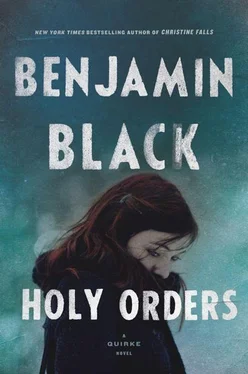Phoebe nodded. She became aware that her mouth was open, and immediately she clamped it shut. True, there were many things she had not known about Jimmy, yet it was a great shock to think that he had never mentioned a sister. Sally was smiling at her still, somewhat ruefully now. “I’m the black sheep of the family,” she said. “They tend to keep quiet about me.”
The girl brought their tea, and the plate of scones. Phoebe realized that, although she could not say why, she suddenly felt happy.
Sally Minor told her story. She had always been in trouble, she said, right from the start. In convent school she had defied the nuns, so that they had to call in the parish priest to try to put manners on her, as the nuns said. “It didn’t work, though,” Sally said, brushing crumbs from her chin. “Their idea of manners wasn’t mine.” At sixteen she had left home and come to the city to attend a secretarial college, where she had taken a course in shorthand and typing. She had never had any intention of being a secretary, however. Jimmy — or James, as she called him — was already a cub reporter on the Evening Mail and she had hoped he might get her a job there. “Then I met Davy,” she said, and laughed, and threw her eyes upwards.
Davy had come to work as an instructor at the secretarial college. The job was only a stopgap, he said, for he had plans to go to England and get a position with one of the big agencies there. “‘Oh, Sally, me dear, me darling,’ he would say to me, opening wide those big brown eyes of his, ‘won’t you come too, and we’ll make our fortune over there together.’”
“And did you go?”
“Oh, I went, of course. The original girl who can’t say no, that’s me.”
Though she greatly doubted it was so, Phoebe was amused. “And what happened?” she asked.
“Davy got a job at a place in High Holborn, very upper-crust, where only the most genteel young ladies were taken on, so he assured me. Young they may have been, but ladylike they were not. They took one look at Davy’s curls and those googly eyes of his and were all over him. I’ve never seen anything like it — they were shameless. And that, of course, was me out in the cold.”
“Did you have to come home?”
“Certainly not! Come home and spend my life thinning beets and mucking out pigsties? No fear. I hung around the pubs in Fleet Street and got picked up by an old boy who worked, if that’s the word, for the Daily Sketch . Godfrey was his name, a terrible boozer and a lecher into the bargain, but he made me laugh, and, more than that, he got me temping jobs on the paper. The features editor was one of those Fleet Street women, tough as old boots and able to drink the likes of Godfrey under the table. She took a shine to me and let me write the odd par for her — you know, the latest coffee bar that’s ‘in,’ and what they’re wearing this year at the Chelsea Flower Show. My big breakthrough was a story I did on a mink farm in Henley-on-Thames, lots of color and a few jokes. The piece was noticed, and the following week I was offered a staff job.”
Phoebe’s tea had gone cold without her noticing. “But now you’re back,” she said.
Sally laughed dismissively. “Oh, no,” she said. “No I’m not. I came over because of James. I had two weeks’ holidays due, and here I am.”
“Have you seen — have you seen your family?”
“They don’t know I’m in Dublin. I’m sure they’re convinced the newspaper job is a fiction and that really I’m working in a whorehouse over there. My brother — have you come across my brother?” Phoebe shook her head, and Sally grimaced. “You haven’t missed anything.”
The clear patch she had made on the window had misted over again, and again she cleared it and peered out at the street.
“Are you expecting someone?” Phoebe asked.
“What? No. No, I’m just—” She frowned, and looked into her cup. She was silent for a time. “Do you see the oily skin that’s on the surface of the tea?” she said, pointing into the cup. “I complained about that once to a waiter, in the Savoy, of all places — Madge the features editor was treating. It wasn’t tea I was drinking, in fact, but a glass of wine. The waiter gave a disdainful little smile and leaned over, very confidential, and said, ‘It is caused by your lipstick, Modom.’ I was mortified, of course. But that’s London for you.”
They laughed, both of them; then Sally was silent again. At last, without looking up, she said, “What happened to James? Do you know? I mean, do you know the details?”
Phoebe suddenly found herself longing for a cigarette. She had given up smoking years ago, and was surprised by the force of this unexpected craving. If she were to smoke now it would probably make her sick. It was so strange to be sitting here with Jimmy’s sister. It should be a sad occasion, but somehow it was not. It was impossible not to be charmed by the young woman’s stories, her dry manner of speaking, her laughter. She was the kind of person Phoebe would have liked to have as a friend. What a pity that she lived in London. Thinking this, Phoebe found herself wondering, as she often did, at her own decision to stay here, in this grim little city, working for Mrs. Cuffe-Wilkes and dining with her father once a week in the sepulchral gloom of the restaurant in the Russell Hotel, pretending not to notice how anxiously Quirke watched her glass, worried she would drink more than her share and leave him short. That was her life. There was David Sinclair, of course, but as much as she liked him — perhaps loved him, even — he was Quirke’s assistant and therefore a part of Quirke’s world. She did not often admit to herself how lonely she was, but now she did. This made her feel sorry for herself, not in the way that, she suspected, most people felt sorry for themselves, but at a remove, dispassionately, almost. Right now, for instance, she was able to look at herself quite coldly, at her drab coat, her black dress with the bit of white lace at the collar, her sensible shoes, the ruler-straight seams of her stockings. Phoebe Griffin, lonely, needy, and sad. Yet it was that Phoebe who was all these things; she herself, this other Phoebe, was over here, standing to one side, looking on. This gift of impersonality, if gift it was, she had inherited from her father, she knew that.
“How long have you been here?” she asked.
Sally shrugged. “Oh, a few days,” she said. This was followed by another silence, and then she laughed. “All right,” she said, “I know you’re too polite to ask, but I admit it: I have been following you.”
“Why?”
“I wanted to see what you were like. From the way James talked about you, I expected a cross between Joan of Arc and what’s-her-name, Clark Kent’s girlfriend.”
Phoebe was astonished. “Did Jimmy talk about me?”
“‘Jimmy’—of course, that’s what you call him. It sounds so odd, as if it’s someone else. Did he talk about you? My dear, he never stopped. He wrote about you in his letters, and then he used to phone me from the office, late at night, when the copy takers had gone home and there was no one around to know he was making trunk calls. Phoebe this and Phoebe that — you must have wondered why your ears were burning all the time.”
Phoebe’s mouth had gone dry. She felt like a scientist, a naturalist, say, or an anthropologist, who after years of studying a particular species makes an unlooked-for discovery about it that means all previous assumptions must be revised and adjusted. Jimmy had been her friend, but not what she would have considered a close friend; however, from what his sister was saying it seemed that Jimmy had thought otherwise. Now Phoebe had to go back over all the years she had known him and reexamine everything. Was it possible — she had to ask herself the question — was it possible he had been in love with her? She could not credit it. In all the times they had met and spoken, he had never once shown her anything more than the commonplace tokens of friendship. In fact, she had always taken it for granted that he despised her a little, in his self-important way, considering her a spoiled daughter of the bourgeoisie — Jimmy liked to pretend he had read Marx — who knew nothing of the harsh realities of the world. And then there was the fact — and it was a fact, though she hated to acknowledge it — that in her heart she had always assumed that Jimmy had not been interested in girls, that he had not been that way inclined at all. “So,” she said now, with a show of nonchalance that she did not feel, “you must know everything about me that there is to know.”
Читать дальше












